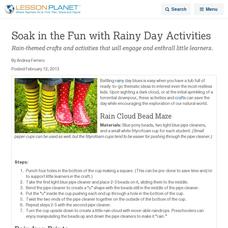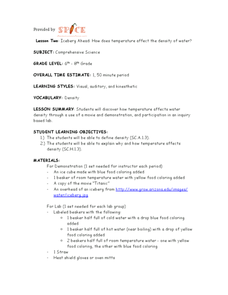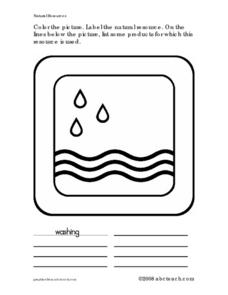Exploratorium
A Splash of Color - Is Pure Water Colorless?
What makes the ocean blue but a glass of ocean water nearly colorless? Investigators prepare tubes of water to examine the color of water. Scholars discover the relationship between light absorption, color variations, and water depth as...
Discover Earth
Weather Stations
Transform your classroom into a fully functioning weather station with this series of hands-on investigations. Covering the topics of temperature, precipitation, wind patterns, and cloud formation, these activities engage young...
Curated OER
Water Cycle Bracelets
Students engage in a lesson that investigates the hydrological cycle. They create bracelets with different colored beads that represent parts of the cycle. Students can follow the cycle in the order of the beads. The lesson includes...
Baylor College
What Is a One Part Per Million Solution?
Water may appear to be crystal clear, but there could be dissolved substances present. Lab groups make a one-part-per-million of a food coloring solution to demonstrate this concept. As part of an outstanding unit about water, this...
Curated OER
Soak in the Fun with Rainy Day Activities
Rain-themed crafts and activities that will engage and enthrall little learners.
Channel Islands Film
Dark Water: Lesson Plan 2 - Grade 3
A discussion of bioluminescence launches an investigation of animal adaptations. After re-watching the opening minutes of Dark Water, class members listen to a reading of What Do You Do with a Tail Like This, and then create a new...
University of Waikato
Observing Water's Thin 'Skin'
Keep the tension up in the classroom. The class first observes as the teacher creates a dome of water above a glass by adding paperclips into an already full glass. Classmates then work in pairs to see how many drops of water can fit...
Curated OER
Scarcity of Water Throughout the World
Students identify the various forms of fresh water on the earth. They observe a demonstration aand read articles that show them the importance of water conservation. They write a journal about their opinion regarding paying for water.
American Chemical Society
Temperature Affects Density
Different substances can have different densities, but can the same substance have different densities? Lesson explores the effect of temperature on the density of water. Extension idea connects the concept of how melting ice in lakes...
Baylor College
How Can We Find Out What Is in Water?
Using paper chromatography, water watchers discover that several substances might be dissolved even though they aren't visible. For this case, you will prepare a mixture of three different food colorings for them to experiment with. A...
Teach Engineering
DNA Forensics and Color Pigments
Use food coloring in electrophoresis. The last segment in a four-part series mimics DNA fingerprinting by using chromatography. Teams conduct chromatography on food coloring to find colors that use similar pigmentation in their makeup.
Curated OER
Water Breathers
Students explore the effects of animal breathing and movement on water currents. In this aquatic animal lesson, students use food coloring to experiment and learn about water currents created by aquatic animals.
Curated OER
Iceberg Ahead: How Does Temperature Affect the Density of Water?
Demonstrate how ice floats on water and get the class thinking about why icebergs are so deceiving. Investigators then experiment with mixing water of the same temperature and water of different temperatures. Make sure to explain the...
Curated OER
Investigating Properties of Water: Temperature
Investigate how temperature affects the density of water and stratification that occurs in bodies of water when temperatures vary. Water of differing temperatures is given different colors to see the layers that form. The lesson is meant...
Curated OER
Fun Activity for Young Children with Autism
Stimulate the senses with this fun activity for young children with Autism. The class makes sensory bottles to use during breaks, down time, or sensory time. They fill the bottles with water, beads, string, glitter, and food coloring,...
Twiggle Magazine
Preschool Color Fun and Activities
I can't stress enough the importance of songs and rhyming chants to the development of early literacy skills. To reinforce color recognition, little ones sing, count, move, and create. All you have to do is choose which of these great...
Curated OER
How Does Water Cool?
How fast does water cool? First fifth graders will draw a line on a graph that predicts how fast they think water can cool from boiling. Then they plot the actual data on the same graph to see if their estimate was correct.
Nuffield Foundation
Investigating the Effect of Temperature on the Activity of Lipase
How does temperature affect lipase activity? Young scholars conduct an experiment to collect data on the interaction of lipase at different temperatures. They add lipase to a solution of milk, sodium carbonate, and phenolphthalein and...
Indiana University
World Literature: “Wu Sung Fights the Tiger,” Anonymous - Commentary by Chin Sheng-t’an From Water Margin
Dive into classical Chinese literature with this packet. Provided first is a comprehensive summary and a half-page long historical context of Water Margin. As your class reads the section entitled "Wu Sung Fights the Tiger," pose the...
American Chemical Society
Chromatography - Color Clues
Here's an activity that will change how one sees color. Pupils try out an experiment on chromatography where they place a drop of food coloring on a coffee filter, add several drops of water, and watch the colors spread and separate....
Curated OER
Natural Resources Coloring
In this natural resources worksheet, students color the picture and label the natural resource. Students then list some products for which the resource is used.
Environmental Protection Agency (EPA)
Teachers' Guide to Using A Day In the Life of a Drop
Hydrology hopefuls learn about their local watershed. Through discussion and online interactives, they see that their habits affect the water supply. The lesson concludes with a pledge to filter out bad water usage habits. It makes a...
May Media Group
Treatment Plants
Young scientists explore nature's water treatment plants in this simple science demonstration. By placing a stalk of celery in a cup of water mixed with food coloring, children are able to observe how plants absorb nutrients and...
Discovery Education
Motion in the Ocean
How do temperature changes affect ocean currents? Scholars explore convection currents by demonstrating the flow of water in a baking dish. They use ice, heat, and food coloring to see currents. Then, they draw conclusions about their...

























